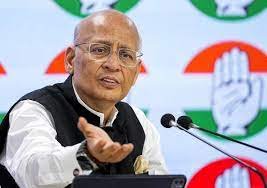In a recent development, the Congress party expressed its satisfaction and hailed the Supreme Court judgments pertaining to the political situation in Maharashtra and the delineation of legislative and executive powers of the Delhi government. Describing these judgments as “seminal and path-breaking,” the Congress party held a press conference at the All India Congress Committee headquarters to address the issue. The conference was led by Abhishek Singhvi, a prominent member of the Rajya Sabha and a national spokesperson for the party, who had actively argued in both of these cases.
Singhvi began by emphasizing the significance of the Supreme Court’s verdicts, stating that they represented a resounding defeat for the Bharatiya Janata Party (BJP) on moral, political, and ethical grounds. The judgments were seen as a setback for the BJP, which had been entangled in the political turmoil in Maharashtra and had been seeking to curtail the powers of the Delhi government.
The first case pertained to the political upheaval in Maharashtra, where the BJP, despite emerging as the single largest party in the 2019 state elections, failed to form the government due to a lack of majority. This resulted in a coalition government being formed between the Shiv Sena, the Nationalist Congress Party (NCP), and the Congress party. However, the BJP had been accused of resorting to unethical means to topple the newly formed government. In this context, the Supreme Court’s verdict was seen as a vindication for the coalition government and a rebuke for the BJP.
The second case involved the delineation of powers between the legislative and executive branches of the Delhi government. The AAP-led government in Delhi had been engaged in a power struggle with the Lieutenant Governor, who represents the central government. The Supreme Court’s judgment defined the respective roles and powers of the two entities, ensuring a more balanced distribution of authority. This was seen as a significant victory for the Delhi government, which had been battling against what it perceived as interference and obstruction from the central government.
Singhvi highlighted that the judgments were not only legal victories but also held immense political significance. He argued that the decisions affirmed the principles of democracy, upheld the autonomy of elected governments, and safeguarded the rights of the people. The Congress party considered these verdicts as landmark judgments that would have far-reaching implications for the future of Indian politics and governance.
Furthermore, Singhvi applauded the Supreme Court’s role as the guardian of the Constitution and a custodian of justice. He emphasized the importance of an independent judiciary in upholding the rule of law and ensuring the democratic functioning of the country.
The Congress party’s endorsement of the Supreme Court judgments was seen as a significant political statement. It sought to portray the BJP as a party that disregards democratic norms and attempts to subvert the will of the people. The Congress party, on the other hand, projected itself as the champion of democratic values and a staunch defender of constitutional principles.
As the press conference concluded, Singhvi reiterated the party’s satisfaction with the Supreme Court’s decisions and expressed hope that they would serve as a deterrent to any future attempts to undermine democratic processes. He called for a renewed commitment to upholding the principles of democracy and urged all political parties to respect the autonomy of elected governments.
Overall, the Congress party’s characterization of the Supreme Court judgments as “seminal and path-breaking” reflects its perception of these verdicts as pivotal moments in the political landscape of Maharashtra and Delhi. By praising the court’s decisions, the Congress party sought to position itself as a protector of democracy and a staunch opponent of any attempts to erode democratic institutions and principles.


